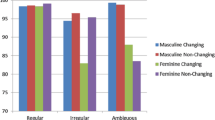Summary
An experiment was conducted in the Serbo-Croatian language in which native speakers/readers made lexical decisions on inflected nouns and legally inflected pseudonouns following inflected possessive pronouns. A possessive pronoun and the noun or pseudonoun that followed it could agree in case, gender, and number (0 violations), disagree in either case or gender or number (1 violation) or disagree simultaneously on two of the three (2 violations). A grammatical congruency effect was observed for both nouns and pseudonouns. Acceptance latencies were shorter and rejection latencies were longer for inflectional agreement than inflectional disagreement. However, for neither nouns nor pseudonouns was the magnitude of the effect influenced by the type or number of violations. The results are discussed in terms of (1) the automaticity of syntactic processes and (2) the properties of a decision making device (specially tailored to rapid lexical evaluations) relative to the properties of the language processor.
Similar content being viewed by others
References
Bidwell, C. E. (1970). Serbo-Croatian nominal inflection. In P. Filipovic (Ed.), The Yugoslav Serbo-Croatian English contrastive project. Washington, DC: Center for Applied Linguistics.
Chambers, S. M. (1979). Letter and order information in lexical access. Journal of Verbal Learning and Verbal Behavior, 18, 225–241.
Cohen, J., & Cohen, P. (1975). Applied multiple regression/correlation analysis for the behavioral sciences. Hillsdale, NJ: Erlbaum.
Fodor, J. A. (1983). The modularity of mind. Cambridge, MA: MIT Press.
Forster, K. I. (1979). Levels of processing and the structure of the language processor. In W. E. Cooper & E. C. Walker (Eds.), Sentence processing. Hillsdale, NJ: Erlbaum.
Goodman, G. C., McClelland, J. L., & Gibbs, R. W. (1981). The role of syntactic context in word recognition. Memory & Cognition, 9, 580–586.
Groot, A. M. B., de (1983). The range of automatic spreading activation in word priming. Journal of Verbal Learning and Verbal Behavior, 22, 417–436.
Groot, A. M. B., de (1985). Word-context effects in word naming and lexical decision. Quarterly Journal of Experimental Psychology, 37A, 281–297.
Groot, A. M. B., de, Thomassen, A. J. W. M., & Hudson, P. T. (1982). Associative facilitation of word recognition as measured from a neutral prime. Memory & Cognition, 10, 358–370.
Gurjanov, M., Lukatela, G., Lukatela, K., Savić, M., & Turvey, M. T. (1986). Grammatical priming of inflected nouns by the gender of possessive adjectives. Journal of Experimental Psychology: Learning, Memory and Cognition, 11, 692–701.
Gurjanov, M., Lukatela, G., Moskovljević, J., Savić, M., & Turvey, M. T. (1985). Grammatical priming of inflected nouns by inflected adjectives. Cognition, 19, 55–71.
Kostić, Dj. (1965). Frequency of occurrence of nouns in Serbo-Croatian. Unpublished manuscript, Institute of Experimental Phonetics and Speech Pathology, University of Belgrade.
Lukatela, G., Kostić, A., Feldman, L. B., & Turvey, M. T. (1983). Grammatical priming of inflected nouns. Memory & Cognition, 11, 59–63.
Lukatela, G., Moraca, J., Stojnov, D., Savić, M., Katz, L., & Turvey, M. T. (1982). Grammatical priming effects between pronouns and inflected verb forms. Psychological Research, 44, 297–311.
Martin, R. C. (1982). The pseudohomophone effect: The role of visual similarity in non-word decisions. Quarterly Journal of Experimental Psychology, 34A, 395–490.
Pattee, H. H. (1972). Laws and constraints, symbols and language. In C. H. Waddington (Ed.), Towards a theoretical biology. Chicago: Atherton-Aldine.
Posner, M. I., & Snyder, C. (1975). Facilitation and inhibition in the processing of signals. In P. M. A. Rabbitt & S. Dornic (Eds.), Attention and performance: Vol. V. London: Academic Press.
Shiffrin, R. M., & Schneider, W. (1977). Controlled and automatic human information processing II. Perceptual learning, automatic attending and a general theory. Psychological Review, 84, 127–190.
Seidenberg, M. S., Waters, G. S., Sanders, M., & Langer, P. (1984). Pre- and post-lexical loci of contextual effects on word recognition. Memory & Cognition, 12, 315–328.
Tweedy, J. R., Lapinski, R. H., & Schvaneveldt, R. W. (1977). Semantic context effects on word recognition: Influence of varying the proportion of items presented in an appropriate context. Memory & Cognition, 5, 84–89.
West, R. F., & Stanovich, K. E. (1982). Source of inhibition in experiments on the effect of sentence context on word recognition. Journal of Experimental Psychology: Learning, Memory and Cognition, 5, 385–399.
Wright, B., & Garrett, M. (1984). Lexical decision in sentences: Effects of syntactic structure. Memory & Cognition, 12, 31–45.
Author information
Authors and Affiliations
Additional information
This research was supported in part by NICHD Grants HD-08495 and HD-01994 to the University of Belgrade and Haskins Laboratories, respectively
Rights and permissions
About this article
Cite this article
Lukatela, G., Kostić, A., Todorović, D. et al. Type and number of violations and the grammatical congruency effect in lexical decision. Psychol. Res 49, 37–43 (1987). https://doi.org/10.1007/BF00309201
Received:
Issue Date:
DOI: https://doi.org/10.1007/BF00309201




